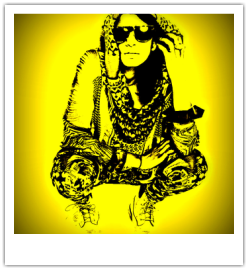 I've always loved me a good button pusher, and I have to say, I'm still a fan of M.I.A, even though we've been really limited in what her label has wanted to have us hear from her of late. It's really interesting to see how some acts manage (or don't manage) to cope with the inevitable withholding of affection that always happens at some point in their careers. M.I.A's fourth studio album Matangi arrived long after it was originally planned and months after fans had hoped for it. There'd been super bowl controversies, lots of run ins with the press and a general reluctance to continue to see M.I.A as the pioneering and experimental artist that she doesn't always get credit for being. More than the goddess of words, Matangi was suddenly M.I.A on a back foot. Let's not forget that M.I.A was once a critic's darling. Her first two albums, Arular (2005) and Kala (2007) received universal acclaim on their release. She vaulted onto the scene out of the emerging social media world, and was celebrated in part for the way in which her records blended world music and hip hop sounds in a way that created something fresh and new. With her mix of Sri Lankan and London heritage, she was as important for the cultural significance her presence suggested as she was her ground breaking music. Here was a polarizing figure who straddled the visual arts, fashion and music scenes in an authentic way that few others had before. In a way she seemed to continue the legacy of eighties acts, but razor fresh and modern. She was the antithesis to Lady Gaga, the industry's template for the same mix. And although they were pitted together and had their own war of words, the reality was that they had their own congregations to preach to. But times have changed. Few artists from the late 'oughties still have the same cache they once did. Look at Gaga- she's the prime example of universal withholding and, bar for Kanye West, there are few other acts with a mainstream presence who are courting the ire of the establishment these days. People fall out of favour. M.I.A isn't a straightforward proposition for anyone. She has a complicated back story, and her music drips with a mix of influences that are meaningless to the wider, western public. And in this new decade the game has changed again. Where we once coveted other influences, we're closing borders and closing our ears and whitewashing it under the name of 'cultural appropriation'. You could never imagine something like Memoirs of A Geisha happening again (the film I mean, and thank God for that: file under film adaptation travesties). M.I.A has made mention on her social media in recent days of a video being blocked for fears of cultural appropriation. The full story and details, as often happens with M.I.A controversies, aren't yet known, and whether or not this is really a case of the PCs, it still begs the question. What constitutes cultural appropriation these days? Aren't we supposed to be living in a ever more globalized world where our ideas are all but interconnected? How is it that so much of what we see and read these days is the product of literal translations or direct copying and we have no problem with that, yet we still seek to limit the cross pollination of ideas when it comes to the arts? I'm pretty sure that sampling a traditional beat, or filming a local dance is not akin to colonizing a country or continent and stripping it of its identity and riches. Rather, what often happens is it turns people onto "new" things and informs the zeitgeist, pushing it into new territory and widening the diaspora. So where's the harm in interpolating other sounds, visuals and ideas with one's own? Doesn't M.I.A have enough of a track record to suggest that she more than adds her own two cents to the mix? Are we seriously trying to suggest that white people should only make white music and black black? How ridiculous. Are major label acts given a set of rules saying what environments can and can't be deemed inspiring? When we tire of somebody we often try to diminish them. In part it happens because we move on from things and people at break neck speeds. Watch or read any interview that M.I.A has granted since 2010 and you'll see that she's been smarting, because she's never been one to articulate her ideas in a conventional way, because we don't allow renegades much free reign these days and because after you've been demonised in the press, it's very hard not to be distrustful. I'm gonna fight the fight for M.I.A, cos, even if you feel that her more recent work isn't on par with her earlier stuff, the reality is without her, we face an alternative where we no longer feel we need the grit to create the pearl. And without that, we just end up rewarding more and more acts like Taylor Swift and the various voice/idol franchise winners, who, all talents aside, do little to push popular culture forward when all is said and done.
0 Comments
 SIX years after it was released, ten of the seventeen tracks on Robbie Williams' seventh studio album are still in high rotation on the fourth incarnation of my itunes. I gotta say, I have a compartmentalised soft spot for Robbie. I find a lot of his early solo catalogue stuff a mix between naff and uninspired 90s kind of corporate pop, but occasionally it was brilliantly done. For me he turned the corner with Sing When You're Winning, and immediately lost me again when he started Swinging with Nicole frigging Kidman, but has since mostly won me over again, even though the masses don't seem to be as up for him as they once were. Robbie for me, is at his best when he makes wonky pop. Unexpected, fun, unpredictable pop that transcends the corporatisation of pop music and lets his genuine talent for writing brilliant lyrics come to the fore. He's got a great voice, and when he's not banging on about aliens or Elvis, his laddiness is pretty god damn charming. He remains one of the only convincing across the board winners of Coffee/Shag, a serious intellectual game which a couple of my besties and I play. We had to invent a third category for him. On Rudebox, Robbie lets rip, and there is a looseness to this recording that he has not ever achieved since. At surface level, the album comes across as Robbie playing with synth pop and stroking himself while he pulls out the witty lines. But this album is more than just a collection of songs that play on pop culture myths. You know, like urban myths that have central pop figures as their subjects. The pairing of The 80's and The 90's are like two distilled memoirs that you simply can't put down. In the space of five minutes Robbie reels off his adolescent achievements ranging from his first sexual and drug encounters, through to some pretty personalised reflections of growing up in 80s England in The 80s. In The 90s he picks up the thread and describes his ascent to boy band stardom and then the spectacular way in which he crashed down from those heights. There is something inherently sad and gripping in these reflections that also shows how skilled Robbie is with writing. Intellect and pop don't often meet, but when they do, like they do here against a melancholic electronic backdrop, the results are pretty astounding. Click on READ MORE to continue the posting. 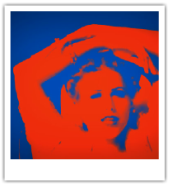 SOPHIE B. arrived in a flurry of breathless press, hype and a little bit of name dropping; David Bowie or Bob Dylan, I can't remember, being a family friend or for whom her mother had been a percussionist. Don't test me on the details, they are not important here. The point was that she came onto the scene with a pedigree. More importantly, she had a stellar debut single that she wrote all by herself: Damn I Wish I Was Your Lover, an instant classic that was, let's be real, one of the greatest songs of the 1990s. Those cheeky munchkins at Slant agree with me. Just. But Sophie was more prodigious musical talent than pop star in the making. She had a way with words, and such a complex musicality that her ability to coo in a poppy way was the red herring in her pop makeup. Although she sang in Madonna's register at times, she bore no other resemblance. Her debut album, Tongues and Tails (1992) offered proof of how she was already on a way more sophisticated plane, which instantly made her a critic's darling; but her sexual ambiguity and bohemian styling made her more difficult to market as anything other than a singer songwriter. While Damn I Wish I Was Your Lover was a heady, hypnotic mix of dirty beats, sexy spoken and sung parts, complete with sapphic references, much of the debut was less textured; more the sound of an urban hippy teenager growing into a singer songwriter. In the hands of Madonna, Right Beside You, the first single from her sophomore effort Whaler, would have been a monster hit; ironic that the vocals on that track often are reminiscent of Madonna. In Sophie's hands, although it was a major pop accomplishment, it was a minor moment for pop lovers. On the other hand, fellow second album track, As I Lay Me Down To Sleep, was one of those radio staples at a time in which we preferred our music a little plaintive, sad, lilting. The mid 1990s were the time of the Cranberries and Prozac, critical elements of mainstream culture that were later proven to offer nothing but a placebo effect. CLICK ON READ MORE TO CONTINUE THE POST...  SOME people believe that the music you listen to is in some measure a reflection of who you are as a person. I'm sure there is something in that, to a certain extent, but what this doesn't really take into account is how music changes over time and how our tastes can both develop and stagnate, and our tendency to associate music with certain times and events in our lives which then renders our preferences non scientific in nature. Music afficionados often feel the need to bring down others for their tastes and preferences. It's a boring snobbery that to me is more reflective of personality than the music someone listens to. Admit it, you all know someone like that, that hangs it on you for your choices. I am surrounded by them. It's insecurity on these people's part that they feel the need to somehow demonstrate that they are more sophisticated or evolved than you. Oxymoron(s). As a pop lover, I am subject to the kind of conversations that teenagers have ad nauseum, because there is an inbuilt judgment being made that I somehow should have evolved beyond my tastes. Just for the record, my itunes collection is pop heavy, but to dismiss my tastes as being surface dance pop would be inaccurate and limited. I know more about music than a lot of the people who criticise my tastes do. But I don't suffer from the same kind of insecurity that makes me feel like I need to defend myself in the face of their stupidity. The idea that I am merely a Kylie/Madonna boy is the cross I have to wear for other people's narrow minds and assumptions. Frankly, to the people with this flawed view; I Don't Give A F*ck. Case in point; I refuse to apologise for my love of Madonna's music. I'm a super fan. People, this is a serious long term relationship that I have been in that has outlasted every non familial relationship I have had. I'm taking it back to 1984 and it has been immeasurably more rewarding than some of the interactions that I have had in the ensuing years. Let's face it, music makes life far more tolerable than people do. Click on READ MORE to continue the post...  We shouldn't seek out to champion people who don't want to champion themselves. But I can't help it! This week, roving around Rome with my ipod on shuffle, I have fallen back in love with Natalie Imbruglia. Again! Nat was originally a soapie star in Australia. That should normally preclude her from being someone worth considering as substantial, or for someone to go into bat for. But no. She seemed to rather effortlessly overcome her past almost instantly. Her first single was a cover version. By technical standards not a recommended way to go about kicking off a music career. But when said cover version is the brilliant Torn you have to give in. Nat's first album was a monster. A huge international phenomenon. Left of The Middle was mostly co-written by Nat, who, arrived on the music scene years after her last episodes of Neighbours had been screened in the UK or Australia, making it seem like a logical, thoughtful career transition, rather than simply jumping on the bandwagon. Natalie also resisted the temptation to go into a dance-pop direction, instead producing something that at least seemed indie inspired, even when it could sometimes verge on the middle of the road rather than the left to the middle. Although from 1997 through to 1999 the singles from Left of the Middle and that beautiful face seemed to be EVERYWHERE, Natalie took her time following up her first album, and when she eventually did, some four years later with White Lilies Island, we got more of the same earthy, soulful pop rock that she had done the first time around, but without the bubbles and the bite. Her slow working ethic impacted on the success of her album a little, as did the more midtempo feel of the album. The beginnings of her squandering her own efforts seemed to set in place. That said, That Day and Wrong Impression received some deserved airplay, but a better idea of what could be found on the sophomore album was Beauty On The Fire. Nice, atmospheric, even if it was nowhere near as good as her first album material, like Smoke. The quality of the material was sufficient to keep her stocks high, if not at the same stratospheric level that she burst onto the music scene with. Her seemingly enviable relationship with Daniel Johns, her natural beauty, and that built in element of cool which she seemed to just naturally exude all contributed to a very warm reception another FOUR years later (detect the pattern?) to Shiver definitely her greatest single to date (okay, her greatest song to date), but the reception to the album, which was yet more restrained than her second album was equally cooler. Whilst Shiver reinvigorated Natalie on the airwaves, she never capatalised on it again. The material on Counting Down the Days, the parent album just didn't have anything as lush, atmospheric and rivetting as its lead single. Natalie seemed to resume her career as a social scene IT girl, and even the eventual release of her greatest hits album, with the shiny, effervescent Glorious seemed a little like an afterthought, even if it came too prematurely, after all, she had only made three albums, albeit over 12 years. Oh but wait. Another four years after Counting Down The DaysNat came back with Come to Life; newly seperated from Johns (they had been my celebrity touch stone couple :( ), and back intoa new pop world and market that she hadn't had success in for years. The album's commercial failure belies some quite good tracks, but one gets the sense that Natalie never really kept up her end of the bargain; with so much goodwill, she seemed to give up on the fight from the outset with her low output in a fast moving world of music, and that's a shame, because, is she herself was fighting the fight, imagine the potential of the songs she might still be recording now after those that she has already delivered. 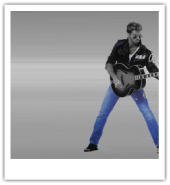 Have Faith. Have Faith. Much has been said about the 20th anniversary of Nevermind by Nirvana. Yep, it was influential, it ushered in the mainstreaming of Seattle culture, and without it we would never have had the pleasure of getting to know Courtney Love. Repeatedly. I love[d] it. But, was Kurt Cobain ever capable of wearing white speedos in a music video about Club Tropicana? Was he ever one of the first white guys to rap in a Wham! Rap??? Did he ever sniff his arm pit from under a leather jacket on a record sleeve? Did he ever bring hope to an entire generation of woggy guys? He most certainly did not. It's coming on 24 years now since George Michael released Faith. Twenty four years on from I Want Your Sex, Faith and Father Figure. He had already had amazing success with Wham! but more importantly, he had already established himself as a major songwriting talent; he wrote and recorded Careless Whisper and watched it become a global smash by the time he was just 21. Six of Faith's nine tracks were singles, a seventh was released in a remix form and they were all corkers; all different, and famously he became the first white artist to top R&B charts with his pretty white boy soul. Kurt Cobain was a troubled soul; amongst his issues were those with the relentless recording industry machine, but lest we forget that by the time Cobain kinda took on that battle, Yorgos had already been there and done that; using supermodels in his videos instead of using his own face to promote his product was the first of his retaliations against the machine; but he must have been devastated at the fallout of his lawsuit with Sony who turned away the mighty support and promotion they had previously furnished, which had helped produce four or five US #1s from Faith. Talent doesn't do that alone kiddies. But he seemed to have a good sense of humour and his later reference to Prince being ''daft'' for scrawling ''Slave'' on his cheek seemed to suggest he hadn't yet lost perspective. George, like Cobain, didn't always handle his fame well; his was one of the most spectacularly documented falls from grace during a particularly puratanical time, after all, the 1990s were not all about Starbucks lattes and emancipation, and they most certainly were not supposed to be about propositioning hotties in public bathrooms. But at least he had a sense of humour about it, and hell, he even landed another hit with the tongue in cheek Outside. George Michael has never come across as a slave to his commercial desires; at least not since the 1990s when he seemed to genuinely question the desire to be in the spotlight. Listen Without Prejudice Vol.1 was a pretty remarkable offering, not quite as accessible as Faith, and later releases Older and Patience seemed to define sophisticated, adult pop, but by then any reference to George seems more concerned with making note of his social transgressions and of how his life seemed to be going off the rails. In recent weeks my Facebook newsfeed has been full of updates and photos of concert goers; Georgie has been touring European cities and staging his music with the assistance of assorted symphonic orchestras across the continent. Photos of the concert goers paint an audience of mixed ages, and by all accounts, its been a successful and well executed show. Interviews and reports suggest he is off the grass and back into functioning mode. I'm always gonna be fighting the fight for GM. I think he is exceptionally talented, has an incredibly soulful voice, and whilst he is prone to a bit of indulgence and that dammed inclination towards heavy balladry, I've always felt the love for him, way back to those first posters I put on my wall; you know the type, him and Andrew Ridgely sitting on a plinth against a photo backdrop that looked like an eighties inspired camoflauge print. Those daft poses, the blonde tips and the white knitted jumpers. Man, if you can make that look sexy and stylish, overcome the speedos and get away scot free from the responsibility of later inspiring every second european guy to maintain a goatee (guilty) AND occassionally get your ass into a studio to make some of the best pop around, then you get my loyalty! Oh Georgey, you don't know it, but I've been in a relationship with you almost as long as I have been with Madge. And that's been pretty much all my life. And here I was always thinking I was afraid of commitment. I think its amazing. I think you're amazing. So I'm not going to mind the fuss about Nevermind. It deserves it, but, as autumn sets in and I get to start thinking about wearing my leather jacket again, I'm gonna be all about the faith. |
Dave
|
|
|
Dave Di Vito is a writer, teacher and former curator.He's also the author of the Vinyl Tiger series and Replace The Sky.
For information about upcoming writing projects subscribe to the mailing list. Dave hates SPAM so he won't trouble you with any of his own. He promises. |
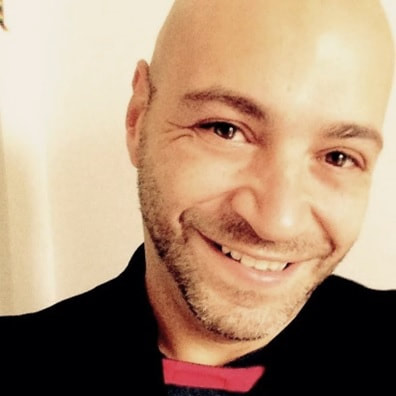
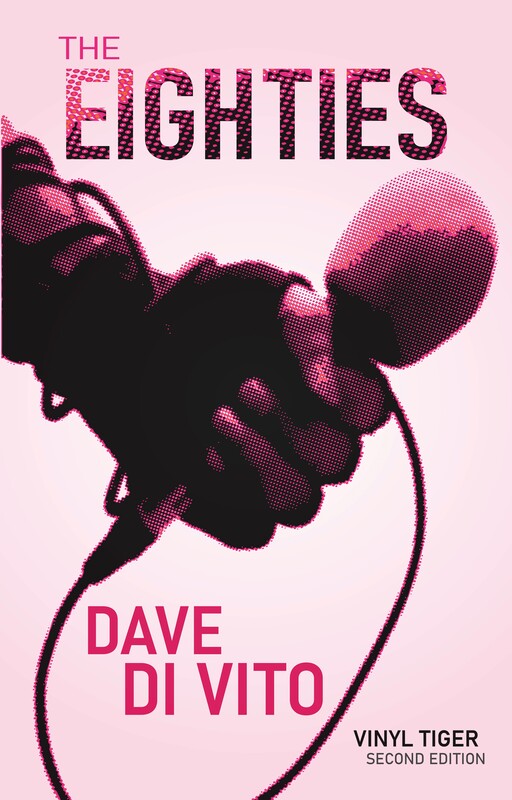
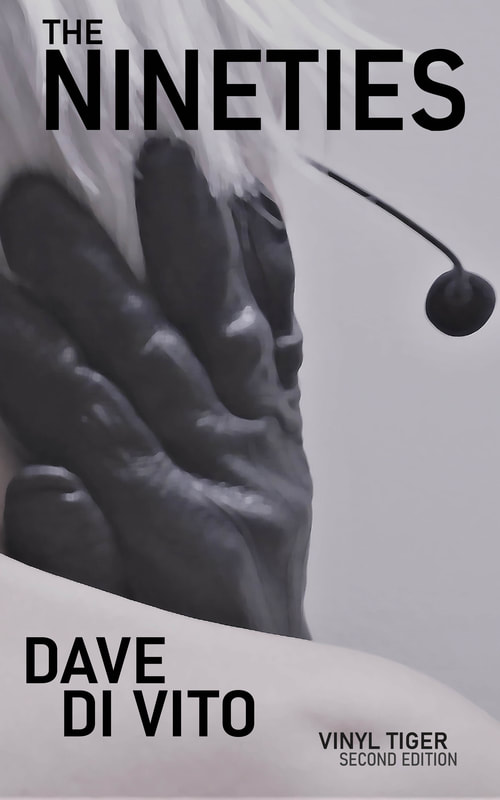
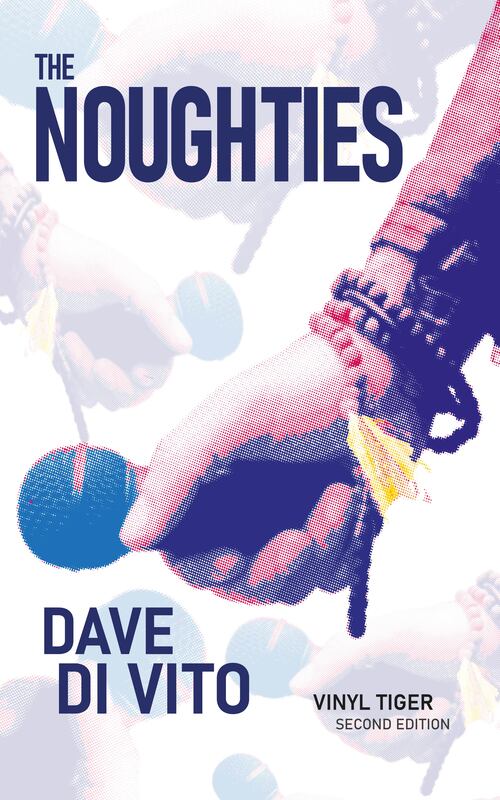
 RSS Feed
RSS Feed